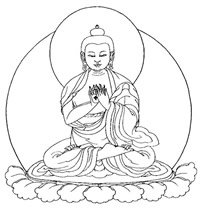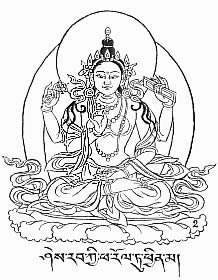buddhism + dharma
Dharma is a Sanskrit term which refers both to the nature of reality and the teachings of Buddhism. Buddhism offers a means to individual and social transformation. Its central message has a universal appeal, but its forms continuously adapt according to the social and historical conditions in which it finds expression.
 The experience developed within the Buddhist tradition, from ancient times up to the present, has created an excellent resource offering a path of practice and spiritual development which can support us towards liberating creativity and deepening insights into the nature of life. These insights and techniques are freely offered to anyone who wishes to learn. Some might begin by looking for peace of mind, or for greater meaning in their life; others might want to develop wisdom and compassion in order to grow into the fullness of their being.
The experience developed within the Buddhist tradition, from ancient times up to the present, has created an excellent resource offering a path of practice and spiritual development which can support us towards liberating creativity and deepening insights into the nature of life. These insights and techniques are freely offered to anyone who wishes to learn. Some might begin by looking for peace of mind, or for greater meaning in their life; others might want to develop wisdom and compassion in order to grow into the fullness of their being.
One of the simplest presentations of the Buddhist path is the three-fold path of ethics, meditation and wisdom. Through the practice of Buddhist inspired ethics, we can help to align ourselves with the interconnected nature of life. This, in turn, supports the practice of meditation which offers specific tools and methods for the radical transformation of consciousness. Through meditation, we can cultivate and draw upon deep resources of awareness and compassion, which nourish a fertile basis for the arising of profound insights – which when integrated, deepened and realised in our total being flower into wisdom.
 The dharma offers both vision and a practical path of transformation. It is essentially a methodology rather than ideology – a set of practices for the transformation of ourselves and the world. It is a way of enabling us to change our understandings into realisations, helping us to embody the insights we have into the nature of the world around us, to live on the basis of those insights, to realise fully our capacity for awareness and compassion, whereby we can truly act on the basis of our interconnectedness.
The dharma offers both vision and a practical path of transformation. It is essentially a methodology rather than ideology – a set of practices for the transformation of ourselves and the world. It is a way of enabling us to change our understandings into realisations, helping us to embody the insights we have into the nature of the world around us, to live on the basis of those insights, to realise fully our capacity for awareness and compassion, whereby we can truly act on the basis of our interconnectedness.
 The tradition is traced back to the historical figure of the Buddha who lived around two and a half thousand years ago. He taught that human beings have an enormous potential for spiritual development and that through practice we can be freed of the suffering which arises from greed, hatred and ignorance. These teachings have been unfolded in many different historical and cultural contexts, giving rise to the various schools and forms of a rich and diverse tradition. Now the dharma is being unfolded and applied in the specific conditions of our time by committed practitioners throughout the world.
The tradition is traced back to the historical figure of the Buddha who lived around two and a half thousand years ago. He taught that human beings have an enormous potential for spiritual development and that through practice we can be freed of the suffering which arises from greed, hatred and ignorance. These teachings have been unfolded in many different historical and cultural contexts, giving rise to the various schools and forms of a rich and diverse tradition. Now the dharma is being unfolded and applied in the specific conditions of our time by committed practitioners throughout the world.
The Buddha taught that every moment is an opportunity to become more loving, generous and aware. Practising his teaching means learning to live in ways that are creative rather than habitual, engaged with others, and truly open to life’s truths. In this way, we can come to see why the Buddhist path is described as the way to Liberation. When asked what quality distinguished his teaching, the Buddha replied:
“Just as the ocean has one taste, the taste of salt, so my teaching has one taste, the taste of freedom.”
For more see: www.fwbo.org
